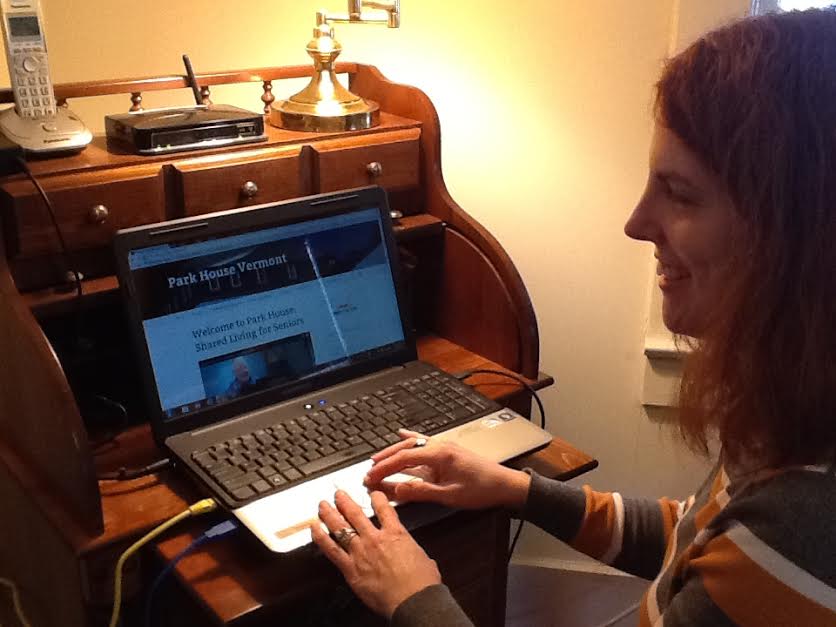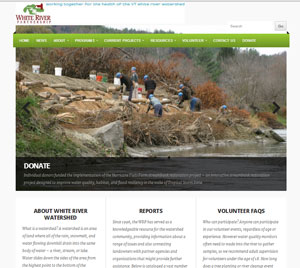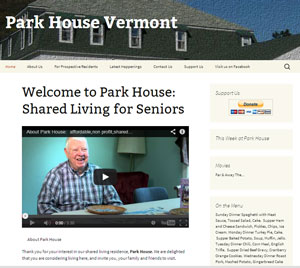 Juli Reiderer, Park House Exectutive Director, looks at her organization’s new website
Juli Reiderer, Park House Exectutive Director, looks at her organization’s new websiteAn empowered organization is a successful organization. For a nonprofit to be successful, it must have control over its message. For most organizations, a website is their public face and, often, the first point of contact between the organization and a potential donor, constituent, or volunteer. This is why web empowerment is extremely important.
Until recently, having control over their web presence was simply out of reach for most small and medium size organizations. Creating or managing a website was a difficult, expensive, and time consuming proposition. Fear was also a real barrier. Messing up could bring the entire website down. Changes and edits required learning how to code HTML or reaching out to a web designer. There was no way for small organizations to quickly and efficiently use their website as a real-time window into the operations of the organization. Thankfully this is no longer the case.
Managing a website no longer needs to be intimidating for a nonprofit of any size. Content management systems, such as WordPress, make adding or editing content as simple as writing an email or drafting a Word document.
Since the start of the project, the Vermont Digital Economy Project has helped nearly twenty nonprofits to revamp their web presence in a way that empowers them to control their own messaging. In the White River Valley alone, we’ve worked closely with organizations in Royalton, Randolph, Bethel and Rochester.
These sites integrate online giving, mailing lists, social media, and often other digital tools to assist the organization in becoming more efficient and increasingly empowered.
 For Potters Angels Rescue, a Randolph based no-kill animal rescue group, the new website has literally saved lives. With ease, the organization can now update the list of pets available for adoption and even feature animals whose situations are most dire. According to Heather Bent, director of the organization, “It is so important to be able to run our own website because with animal rescue, things change so quickly. It’s nice to have immediate access and the capability to make changes as needed.”
For Potters Angels Rescue, a Randolph based no-kill animal rescue group, the new website has literally saved lives. With ease, the organization can now update the list of pets available for adoption and even feature animals whose situations are most dire. According to Heather Bent, director of the organization, “It is so important to be able to run our own website because with animal rescue, things change so quickly. It’s nice to have immediate access and the capability to make changes as needed.”
Another group we assisted is the White River Partnership. The White River Partnership is a grassroots non-profit organization that brings together people and local communities to improve the long-term health of the White River and its watershed. The flexibility and usability of the new website will allow them to focus more on their core mission and assist in volunteer recruitment.
“Working with VDEP has allowed us to rebuild our website on a WordPress platform and take advantage of free web and email hosting services. In addition we have learned how to integrate new technology tools in order to use our web presence to accomplish our mission of bringing people and communities together to improve the long-term health of the White River and its watershed,” said Mary Russ, Executive Director of the White River Partnership.
 Websites are important for all types of groups. In the case of Rochester-based Park House, being able to timely add new photos is helping them build community at their senior living center, as well as recruit new residents. According Park House Director Juli Redier, “Park House is very excited to be able to put events and current pictures on our website so that it will be a resource that prospective residents and current friends can get excited to visit. We will no longer be in a situation where once you’ve seen our website, you no longer have a reason to ever look again.”
Websites are important for all types of groups. In the case of Rochester-based Park House, being able to timely add new photos is helping them build community at their senior living center, as well as recruit new residents. According Park House Director Juli Redier, “Park House is very excited to be able to put events and current pictures on our website so that it will be a resource that prospective residents and current friends can get excited to visit. We will no longer be in a situation where once you’ve seen our website, you no longer have a reason to ever look again.”
In addition to Park House, the White River Partnership, and Potter’s Angels, the Vermont Digital Economy Project, with the assistance of tech volunteers from Code for BTV, has also provided the Bethel Food Shelf (article) with their first website and created a website for the Arts Bus that makes it easy for them to quickly post kids’ art projects for the world to see. Statewide, the project has assisted twenty groups with web projects.
